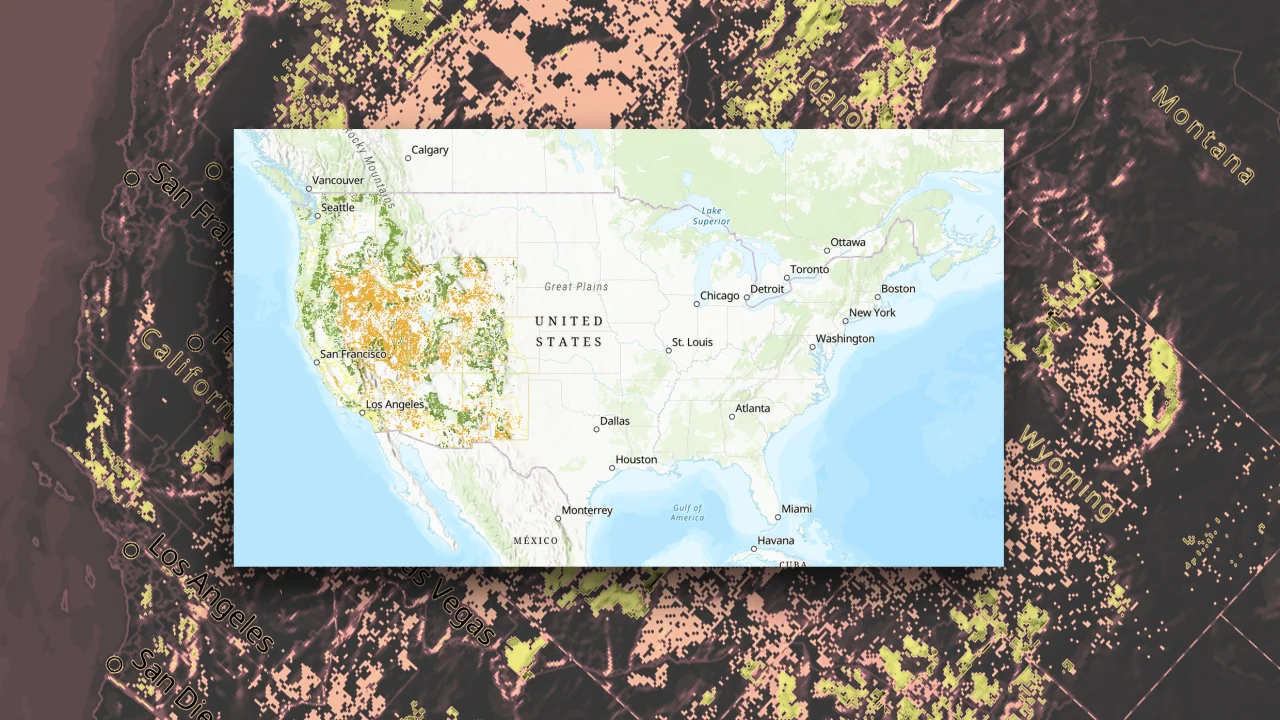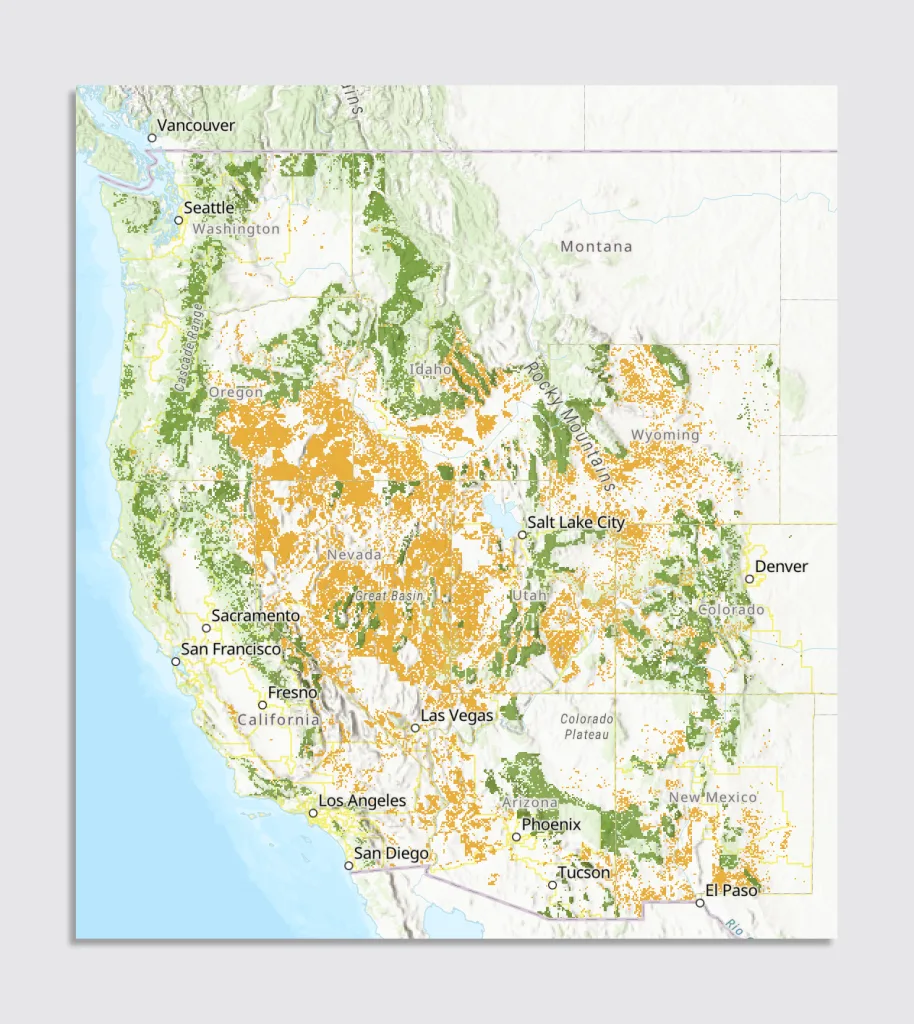Map: All 250 million acres of public land the Trump budget bill would sell off
The Senate budget bill—also called the reconciliation bill, or Trump’s “One Beautiful Bill Act”— is making headlines for its drastic cuts to Medicaid, its rollback of clean energy tax credits, and the fact that it would raise the debt ceiling by $5 trillion. It’s also threatening to take away millions of acres of public land. Nearly 150 groups, including the Natural Resources Defense Council, the Center for Biological Diversity, and local organizations like Alaska Wilderness League and New Mexico Wild, have urged Senate members to reconsider this “unprecedented” sell-off of public lands. The Senate budget bill would be a “fire sale” of America’s public lands and waters, Bobby McEnaney, director of land conservation at the Natural Resources Defense Council, said in a statement. The bill would force the sale of between 2 million and 3 million acres of public lands from the Forest Service and Bureau of Land Management, acres that span 11 Western states. (The state of Connecticut is about 3.1 million acres, for comparison). [Screenshot: The Wilderness Society] The bill also makes even more public land eligible for sale—more than 250 million acres, including hiking trails, ski resorts, wilderness study areas, national monuments, and critical wildlife migration corridors. New areas would also be opened for oil leasing and offshore drilling under the bill, including in the Gulf of Alaska. If passed, the bill would likely be “largest single sale of national public lands in modern history,” according to the Wilderness Society. It’s a move Senate Republicans are making, multiple groups note, in order to pay for billionaire tax breaks. The bill “trades ordinary Americans’ access to outdoor recreation for a short-term payoff that disproportionately benefits the privileged and well-connected,” the Wilderness Society says. Senator Mike Lee, a Republican from Utah and chairman of the Senate Committee on Energy and Natural Resources, has also said the bill would create opportunities for housing. But nature organizations say it would do no such thing—and that it would bring more harm to the public. “There is no provision to prevent lands sold under Lee’s bill from being developed into high-end vacation homes, Airbnbs, or luxury housing projects,” the letter signed by dozens of organizations reads. Selling these lands, they add, “threatens public access, undermines responsible land management, puts environmental values, cultural resources, and endangered species at risk along with clean drinking water for 60 million Americans and betrays the public’s trust.” That 250 million acres of public lands are at risk can be hard to visualize. The Wilderness Society made an interactive map, showing both the Bureau of Land Management and U.S. Forest Service lands the bill makes eligible for sale. The map illustrates how those 250 million acres span 119 congressional districts, reaching all the way from Alaska down through the Western United States, and over past the Rocky Mountains. “This bill would lead to a wave of irreversible extraction that will rob future generations of public access to lands and waters that belong to all of us—just to bankroll tax cuts for the superrich,” McEnaney said in his statement. “As currently proposed, Americans will soon lose permanent access to the public lands close to home, their favorite trails, their parks, and their favorite recreation areas. Once these lands are sold, and the no trespassing signs go up, there will be no going back.”

The Senate budget bill—also called the reconciliation bill, or Trump’s “One Beautiful Bill Act”— is making headlines for its drastic cuts to Medicaid, its rollback of clean energy tax credits, and the fact that it would raise the debt ceiling by $5 trillion. It’s also threatening to take away millions of acres of public land.
Nearly 150 groups, including the Natural Resources Defense Council, the Center for Biological Diversity, and local organizations like Alaska Wilderness League and New Mexico Wild, have urged Senate members to reconsider this “unprecedented” sell-off of public lands.
The Senate budget bill would be a “fire sale” of America’s public lands and waters, Bobby McEnaney, director of land conservation at the Natural Resources Defense Council, said in a statement. The bill would force the sale of between 2 million and 3 million acres of public lands from the Forest Service and Bureau of Land Management, acres that span 11 Western states. (The state of Connecticut is about 3.1 million acres, for comparison).

The bill also makes even more public land eligible for sale—more than 250 million acres, including hiking trails, ski resorts, wilderness study areas, national monuments, and critical wildlife migration corridors. New areas would also be opened for oil leasing and offshore drilling under the bill, including in the Gulf of Alaska.
If passed, the bill would likely be “largest single sale of national public lands in modern history,” according to the Wilderness Society. It’s a move Senate Republicans are making, multiple groups note, in order to pay for billionaire tax breaks. The bill “trades ordinary Americans’ access to outdoor recreation for a short-term payoff that disproportionately benefits the privileged and well-connected,” the Wilderness Society says.
Senator Mike Lee, a Republican from Utah and chairman of the Senate Committee on Energy and Natural Resources, has also said the bill would create opportunities for housing. But nature organizations say it would do no such thing—and that it would bring more harm to the public.
“There is no provision to prevent lands sold under Lee’s bill from being developed into high-end vacation homes, Airbnbs, or luxury housing projects,” the letter signed by dozens of organizations reads. Selling these lands, they add, “threatens public access, undermines responsible land management, puts environmental values, cultural resources, and endangered species at risk along with clean drinking water for 60 million Americans and betrays the public’s trust.”
That 250 million acres of public lands are at risk can be hard to visualize. The Wilderness Society made an interactive map, showing both the Bureau of Land Management and U.S. Forest Service lands the bill makes eligible for sale.
The map illustrates how those 250 million acres span 119 congressional districts, reaching all the way from Alaska down through the Western United States, and over past the Rocky Mountains.
“This bill would lead to a wave of irreversible extraction that will rob future generations of public access to lands and waters that belong to all of us—just to bankroll tax cuts for the superrich,” McEnaney said in his statement. “As currently proposed, Americans will soon lose permanent access to the public lands close to home, their favorite trails, their parks, and their favorite recreation areas. Once these lands are sold, and the no trespassing signs go up, there will be no going back.”

































































































![Building A Digital PR Strategy: 10 Essential Steps for Beginners [With Examples]](https://buzzsumo.com/wp-content/uploads/2023/09/Building-A-Digital-PR-Strategy-10-Essential-Steps-for-Beginners-With-Examples-bblog-masthead.jpg)
















































